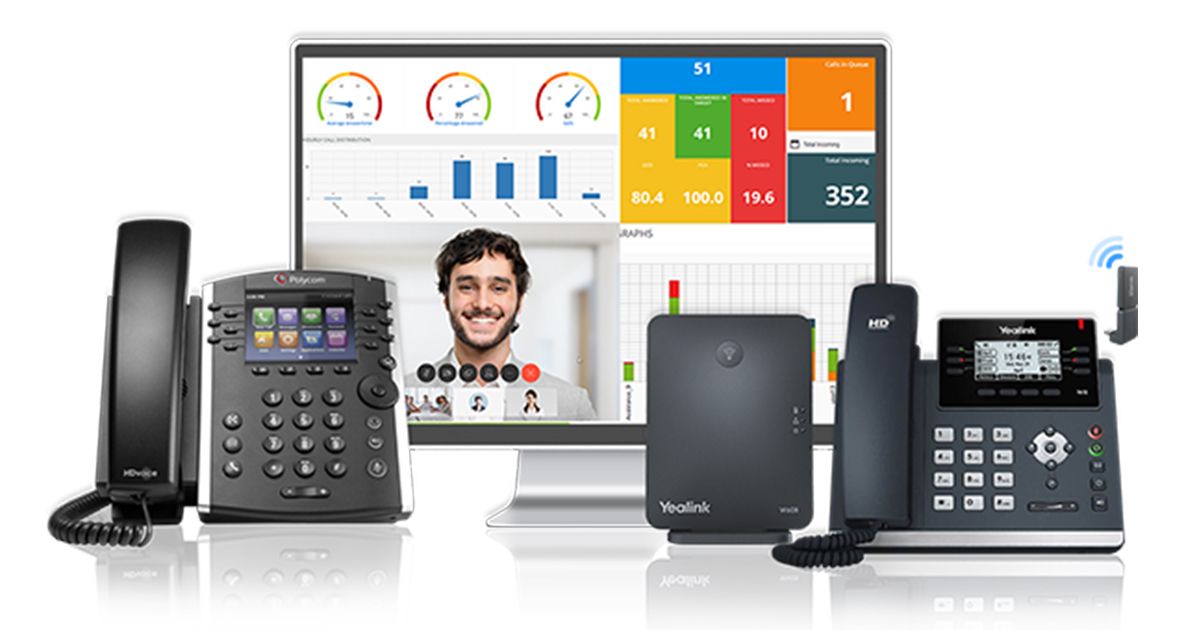There are numerous varieties of telephone systems, which can be confusing. To assist you in making the best choice, we will explain how business phone systems function and which ones are ideal for your business.
Table of Contents
What is an enterprise phone system?
A business phone system is a device that enables small and medium-sized enterprises to make and receive phone calls and manage their communications. The majority of significant businesses have their own PBXs. Smaller enterprises can utilize IP-based or hybrid solutions.
A PBX utilizes traditional analog telecommunications (such as those found in the office) to connect employees and customers. In contrast, an IP-based system employs digital technology rather than analog signals. Meaning it is simpler for workers on different floors to communicate over long distances without interference from outside noise or other users on the same line.
IP-Based Telephone Networks
IP-based phone systems are the most prevalent phone system type. This means that they connect to your network and other devices via the Internet. Instead of a conventional analog connection. This enables you to connect any office-based device (such as a computer or tablet) to the internet. Include any mobile phones your personnel may possess.
IP-based systems are more versatile than other varieties because they can be implemented anywhere. And do not require users to purchase new apparatus whenever they relocate. Nonetheless, this adaptability comes at a cost. The price of an IP PBX system is greater than that of traditional systems, such as hardline or wireless solutions.
Choose between these two business communication options. Consider whether it will be worthwhile to pay for this added flexibility when it comes time to make enhancements in the future.
Advantages of IP-Based Systems
Traditional PBX systems are less adaptable than IP-based systems. You can add or remove lines without worrying about your phone system losing its configuration or call routing being disrupted, as you would with a conventional PBX system. This makes them ideal for businesses seeking rapid growth and consumer expansion without purchasing new hardware or software licenses.
It is faster to install, maintain, and upgrade IP-based systems
They are also less expensive because they do not require specialized apparatus (iPhones already have built-in VoIP capabilities). You need only a Wi-Fi router. Which the majority of individuals already possess. And an Internet connection for your Internet-based business phone system to function correctly!
IP-based systems are more secure than conventional PBXs because user identities are not transmitted between devices. Instead, each device has its own locally-stored unique identifier. Therefore, there is no risk of data being compromised during transmission between devices when someone signs into their office account from home using an iPad instead of a laptop computer (this occurs all too frequently!).
Read: One button is used to play Drift Boss, a drifting game.
Negatives of IP-Based Systems
The difficulty of updating: The most evident disadvantage of IP-based systems is that they are difficult to upgrade. This is especially challenging when examining a system that has existed for years or even decades. As did many older PBXs (private branch exchanges). You may be required to pay a technician or third-party company to perform all of the tasks for you. Which can be both expensive and time-consuming.
The difficulty of installation: Setting up an IP-based phone system requires more steps than setting up traditional analog systems. Because everything is software-based rather than hardware-based. And if multiple users in your organization desire their own private lines. Each employee will require two separate accounts as opposed to one shared account in an analog system.
The difficulty in maintaining
In addition to being costly and challenging to modify or repair when required due to its complexity (see above). Over time, an IP-based phone system requires extensive maintenance. There will be lengthy stretches where you do not know whether or not they are functioning effectively. Because they have not yet been examined! If something goes awry while someone else is using yours, they may not be aware of the extent of the damage. This type of occurrence is possible, although it should not occur frequently. That it becomes necessary to schedule monthly maintenance visits. Instead, once every couple of months, as normal people do when owning an expensive item of this sort, is sufficient.”
Mixed Telephone Infrastructure
Consider a hybrid system if you need a phone system that is compatible with both traditional analog phones and VoIP. Hybrid systems combine IP (Internet Protocol) and analog components. This indicates that they enjoy the best of both environments. The adaptability of digital communications and the functionality of a standard landline.
Hybrid systems are typically more expensive than IP-only models due to the fact that they incorporate two technologies into a single product. Additionally, they are typically more expensive than VoIP-only solutions. However, they typically experience fewer issues with VoIP connections and compatibility with other services, such as Skype and WhatsApp chat applications. Because they employ traditional voice frequencies in addition to Wi-Fi signals, unlike many modern phones.
Advantages of Hybrid Systems
Hybrid systems are economical. Depending on the features you wish to include, a hybrid phone system can be implemented in your office or at home. This sort of system’s adaptability is its best quality. You are not required to purchase extra equipment if you do not require it. In addition, there are no monthly fees associated with installation!
Negatives of Hybrid System
Basic phone systems are less expensive than hybrid phone systems. In addition, they offer numerous benefits and advantages over analog and digital options. One of the most important reasons is that a hybrid system will keep your business functioning efficiently with less hassle over time.
A hybrid system is comparable to an integrated solution: It integrates multiple functions into a single device. That can perform multiple duties without additional cabling or power sources from you or your IT department (which means no more searching for replacement parts). This reduces the amount of work required for you and your employees when using this type of system. Additionally, less money is spent on maintenance!
Which Model Fits Your Needs?
Examining your business’s requirements is the first step in selecting the ideal business telephone system. Do you require a sophisticated solution to keep track of incoming calls and messages, or will a basic method suffice? Do you have a large number of employees who require access to simple features such as voicemail transcription, call redirection, and call waiting? If so, an integrated system may be the optimal solution for your requirements.
Consider whether it is essential to include other features in a phone system for small businesses like yours or even larger businesses
For instance: Accessing confidential information (such as financial data) via a mobile phone raises any particular security concerns? Or perhaps customer service representatives in diverse locations do not always have their own desktops. Instead, do they share a single computer when collaborating on initiatives spanning multiple cities/states/countries? In this situation, it would be optimal to have multiple lines available at all locations. Because it ensures that everyone, regardless of where they reside, will always have access during busy times. For example, on holidays when everyone else has already left town but you still want some peace and quiet while still being able to reach someone swiftly in case of an emergency.
To make an informed decision, you must comprehend your organization’s requirements and available resources
Understanding your business’ requirements is the first step in selecting a phone system for your company. Prior to making an informed decision. It is essential to comprehend these requirements and how they correlate with the features provided by each service provider.
Recognize your company’s needs: Consider the objective of your phone system and how it will assist you to achieve it. Will it be used for teleconferencing or remote work? Do you require multiple phone numbers on a single device (for example, a sales line and a customer service line)? Do some employees require apparatus that doesn’t require any internet connection at all? For example, antiquated telephones with analog circuitry. Others may favor modern smartphones over alternatives such as landlines due to their convenient features (such as being able to check voicemails while away from the office). Having this information beforehand will help you determine which companies offer the most suitable products for your needs!
Conclusion
If you’ve reached this point, we’re confident that you have a basic understanding of business phone systems and the various varieties available today. Now is the moment for serious inquiries! What are your requirements for your phone system? What is the optimal suit for your company? These are all vital inquiries, and your responses to them are essential. Thereafter, there are steps involved in having this setup operational. This article discusses the most important features to consider when selecting the best phone system for your business. Now let’s examine some practical examples of how each type operates. So that when the time comes to make an actual purchase decision, there will be no unpleasant surprises.


